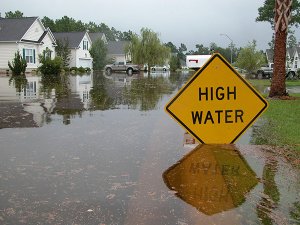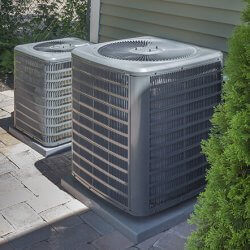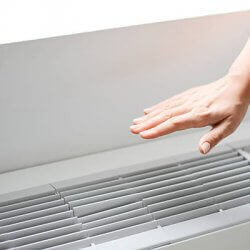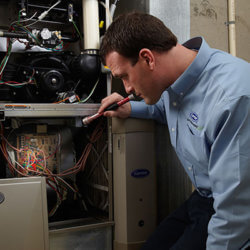
Keeping your air conditioner in good working order requires regular maintenance and care. So if you are asking these kinds of questions about the kind of care your HVAC system needs, you are already in the right mindset.
There is a lot you can do to keep your air conditioner running efficiently and protected from the elements, but thankfully, protection from rain is rarely an issue.
One reason that many assume rain can be a problem, is that your air conditioner’s compressor unit is outside. While it would be a problem for the internal portion — the evaporator coil, which is generally located in your furnace — to get wet, the compressor unit is designed to stand up to the elements. Of course, no design is perfect, and your compressor unit might face wear and tear from weather. There is not much you can do for this though, besides keeping up with regular maintenance visits for your heating & air conditioning.
To schedule regular maintenance or if you suspect a problem with your HVAC system, connect with us in St. Louis to schedule an appointment!
Tips for Protecting Your Air Conditioner
Don’t Cover Your Air Conditioner
What you should not do during rain is cover your compressor unit — the outside portion of your air conditioner — with tarps or other objects that might block air flow, and never operate the unit while covered. Not only will this make your air conditioner much less efficient, it can actually promote rust by trapping water against components that are meant to be dried by airflow. This in-built drying mechanism is enough for your unit, and you may be making things worse by trying to prevent rain from reaching your air conditioning unit.
When to Worry About Rain

There is, however, one time when it is worth worrying about rain, and this is if there is a risk of flood that might submerge the unit. While the outside is well equipped to deal with rain, the parts on the inside are not. So if there is water flowing into the air conditioner, or standing water that is stuck on the inside, you will need professional help to get the unit up and running again.
If you do find yourself in a flood situation, it is important that you do not try to fix or dry the inside of the unit yourself. There is a risk of electrocution or fire, and it is best to leave this part to a professional team. What you can do is turn off electricity to that part of your house, to prevent potential electrocution, and then try to dry around the air conditioner as much as possible. If you have standing water in a crawl space or a basement, the sooner you can remove that water, the less damage will be done. Safety is paramount though, and if you are not sure of something, wait for professional help. Once things are fully dry, you should be able to return to normal use, but again, you want to wait until a professional has cleared the machine to be turned back on after ensuring there is no damage that could cause fire or electrocution.
What About Snow?
On a similar note, most air conditioner units can handle a fairly large amount of snow. Again, air conditioners are made to withstand these kinds of conditions because the compressor unit is meant to sit outside. For areas with very heavy snow however, you may need to clear large accumulations of snow from around the unit, as you do not want to risk having it completely buried or collapsing under very heavy snow.
Contact Galmiche & Sons for More Answers to Your Air Conditioner Questions
For more information about heating & air conditioning maintenance or to schedule a maintenance check for your St. Louis area home, contact Galmiche & Sons today.












